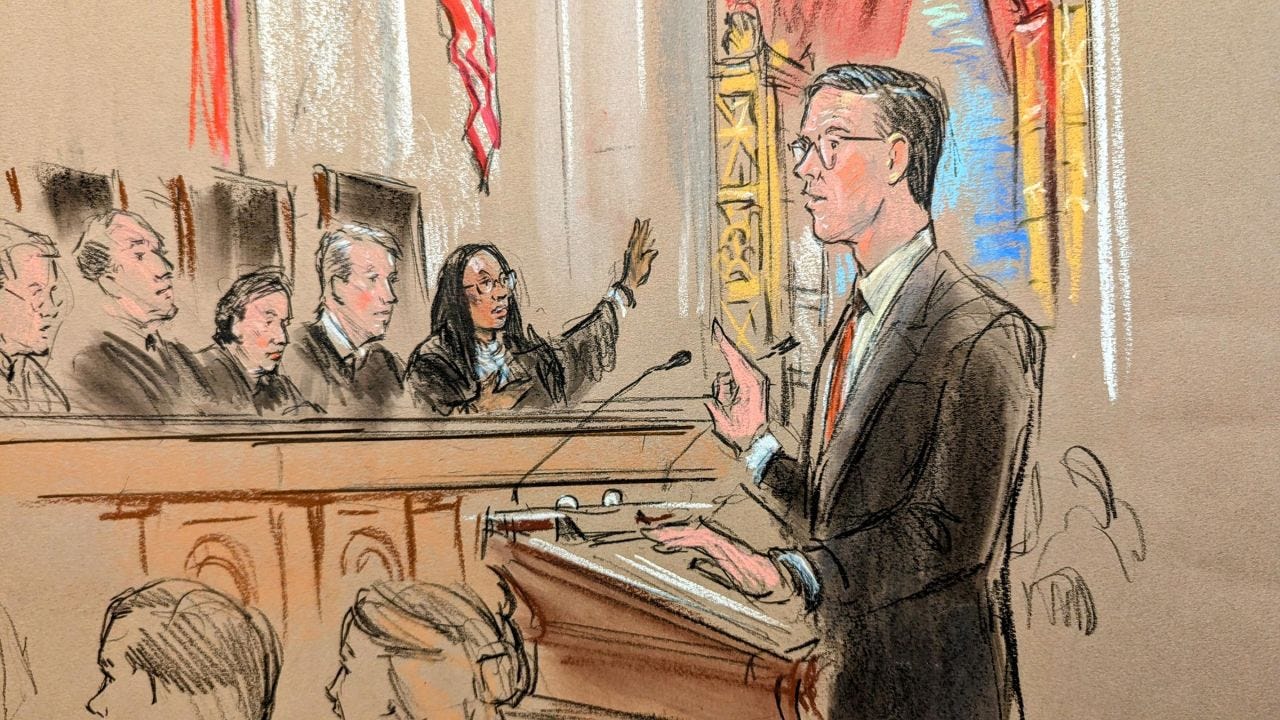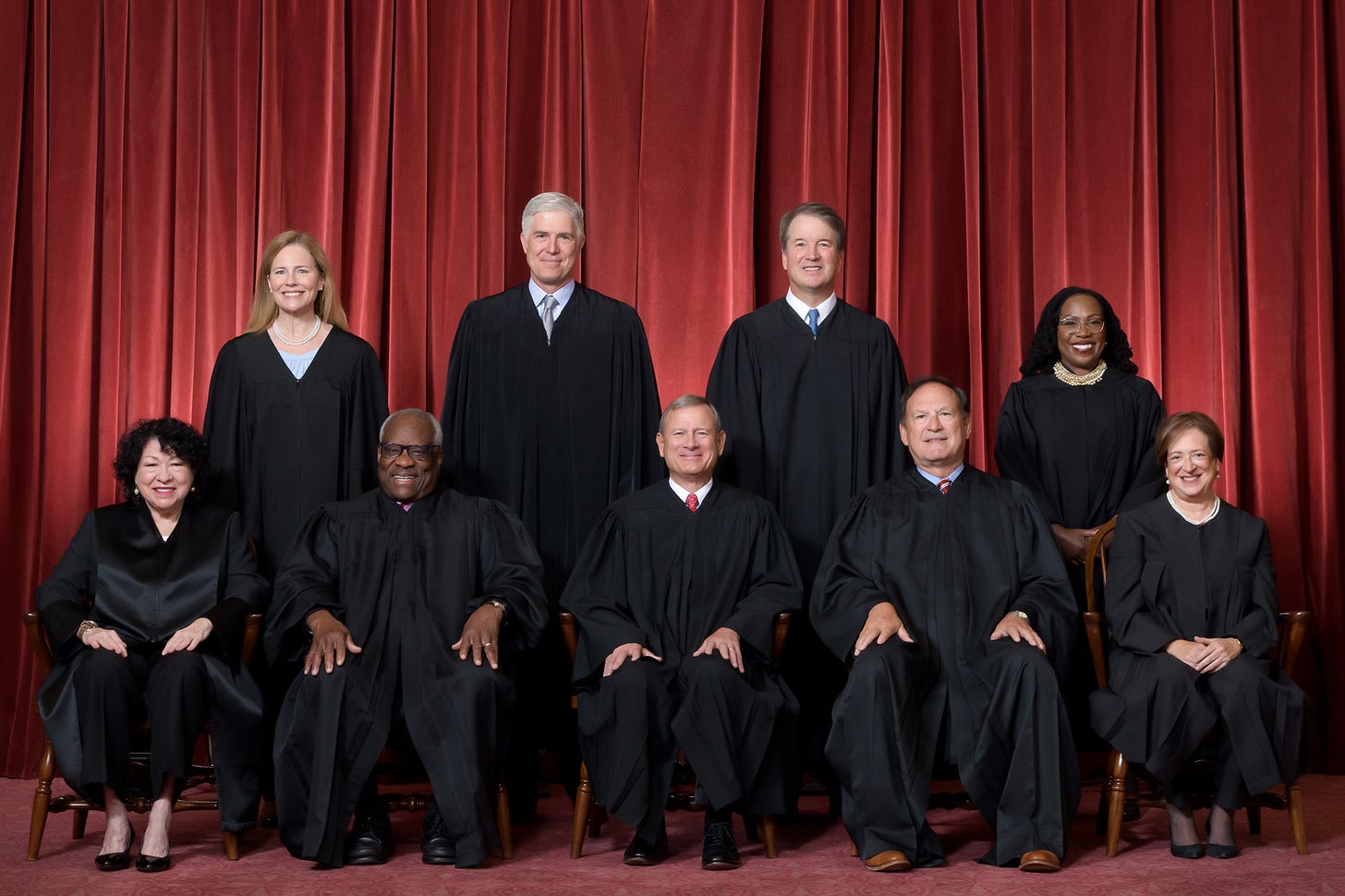Trans Rights Before the Supreme Court
This case has far reaching potential.
For years, L.W., who began life as a boy, felt like she was drowning. Trapped in the wrong body. As a transgender teenager in Tennessee, L.W. didn’t know what to do with her feelings of gender dysphoria. Her mother, Samantha Williams, also felt helpless, saying that it was, “incredibly painful watching my daughter struggle.”
L.W. went through a barrage of assessments, and afterwards, the Williams family weighed the pros and cons of a medical transition. Ultimately, Samantha Williams felt it was the right thing to do. “As a mother,” she said, “I could not bear watching my child go through physical changes [male puberty] that would destroy her well-being and cause her life-long pain.”
In 2021, L.W. began taking puberty blockers prescribed by a provider at Vanderbilt Medical Center. The next year, she started estrogen. According to court documents, Samantha said that “once L.W. started treatment, I could immediately see the heavy weight being lifted off her shoulders.” She says the care was, “life-saving” and said they now “have a confident, happy daughter … who is free to be herself and is thriving.”
L.W.’s story is similar to that of Ryan Roe, a 16-year-old transgender boy, and John Doe, a 13-year-old transgender boy. Ryan was so anxious about puberty that he used to “throw up before school every morning” and “considered going mute to protect [himself] from the pain and anxiety that [his] voice caused.” Ryan started hormone therapy in 2022, and says that the ability to access it saved his life. John Doe says he knew from early childhood that he was meant to be a boy, choosing a male name for himself and socially transitioning at school. After years of therapy, he too started puberty blockers.
Then, in 2023, Tennessee passed a law prohibiting transgender minors from receiving the kind of medical care for gender dysphoria that L.W., Ryan, and John were getting. The law blocked treatments that would allow “a minor to identify with, or live as, a purported identity inconsistent with the minor’s sex” or to treat “purported discomfort or distress from a discordance between the minor’s sex and asserted identity.”
The three families joined forces with a Dr. Susan Lacy, a Memphis gynecologist, to file a lawsuit over Tennessee’s new law. Eventually, the case made its way to the Supreme Court, who heard oral arguments yesterday in United States v Skrmetti.
The Biden administration argues that Tennessee’s law violates the Equal Protection Clause of the 14th Amendment, which prohibits discrimination on the basis of sex.
Tennessee argues that they are protecting the health and welfare of its youth from potentially dangerous treatments.
To date, this is the most consequential case to come before the Supreme Court regarding transgender rights, and it could have a significant domino effect around the country.
The Tennessee bill was sponsored by the state House Majority Leader, William Lamberth, who said that minors aren’t mature enough to make life-altering decisions, and that, “these treatments and procedures have a lifetime of negative consequences that are irreversible.”
One of the stated goals of the bill is to “take action to protect the health and welfare of minors.” The law says that Tennessee “has a legitimate, substantial, and compelling interest in encouraging minors to appreciate their sex, particularly as they undergo puberty” and wants to protect minors from becoming “disdainful of their sex.”
The issue first came to a head in Tennessee after stories circulated online claiming that Vanderbilt was performing genital surgeries on minors. Vanderbilt denied these claims, saying it only provided a small number of chest surgeries on minors ages 16 years and older who have full parental consent.
The Tennessee Chapter of the American Academy of Pediatrics urged the governor not to sign the bill, saying that it “interferes with the physician-patient relationship and parental choice.” They said that they “follow evidence-based medicine and clinical practice guidelines rather than politics.”
Nineteen other states based similar bans in 2023, and currently, 26 states ban transgender care for youth. According to the Williams Institute at the UCLA School of Law, there are about 300,000 Americans aged 13 to 17 who identify as transgender, many of whom are impacted by statewide bans.
In a brief submitted to the court, Tennessee Attorney General Jonathan Skrmetti claims that the state is not making a classification based on sex, but instead, the bill “draws a line between minors seeking drugs for gender transition and minors seeking drugs for other medical purposes. And boys and girls fall on both sides of that line.”
What he’s saying is that this bill isn’t about sex discrimination, because the law applies equally to boys and girls.
He also argues that the law “does not classify based on transgender status,” and that the bill bans certain procedures, including surgery, puberty blockers, and cross-sex hormones, when used solely for a gender transition. But it allows physicians to use these treatments for other medical conditions, like precocious puberty.
Skrmetti says the state is within its right to make laws like this one, because “the Constitution vests politically accountable state officials with primary responsibility for protecting the public health and welfare. With such power has always come wide discretion to regulate medical practices, particularly in areas of scientific uncertainty.”
Tennessee argues that many people who receive treatment for gender dysphoria come to regret their decision. Therefore, Tennessee says the bill protects minors from potentially dangerous or destructive treatments.
During yesterday’s hearing, TN State Solicitor General Matt Rice, who argued before the court, said, “Our fundamental point is there is no sex-based line here.”
But the Biden administration disagrees, saying that this bill is directly targeting transgender youth because children who are not trans can access hormone therapy, while transgender children cannot.
US Solicitor General Elizabeth Prelogar, who is arguing on behalf of the administration, said during her opening statements yesterday, “This case is about access to medications that have been safely prescribed for decades. That’s wrong. SB1 regulates by drawing sex-based lines,” and that it, “singles out— and bans—only treatments for gender dysphoria.”
In other words, they say that because the law blocks treatments for one specific group based on sex and gender identity, it meets the criteria for sex discrimination under the 14th amendment.
Prelogar explained the sex discrimination similarly to this: If John Doe, born male, wants to take hormones to deepen his voice, he would be permitted to. But if Jane Doe, born a female, wants to take those exact same drugs to deepen their voice, they would not be permitted to. Thus, the law only applies to one sex, and there is not equal protection under the law.
A difference of medical opinion
The two sides also disagree on how risky gender-affirming care is for minors. In short: Tennessee argues that it's dangerous enough to need a ban, the government argues Tennessee is exaggerating, and that in fact the treatment can be lifesaving for minors diagnosed with gender dysphoria.
The law says transgender care is not consistent with “professional medical standards” and that these treatments are “being performed on and administered to minors in this state for such purposes, notwithstanding the risks and harms to the minors” such as “becoming irreversibly sterile, having increased risk of disease and illness, or suffering from adverse and sometimes fatal psychological consequences.”
Multiple conservative justices seem to question the safety of the treatment. Justice Samuel Alito said some European countries have walked back on allowing gender-affirming care for minors. Prelogar argued that while his statement is true, other countries have not outrightly banned the care, which is what Tennessee has done.
Later, Justice Samuel Alito also questioned whether gender-affirming treatment actually reduces the risk of suicide, and whether that science is fully established. ACLU lawyer Chase Strangio, who argued yesterday on behalf of the families who sued and is the first openly transgender lawyer to argue before the Supreme Court, said it is established and does prove there is a decrease in suicidal risk.
Kavanaugh also questioned how many people regret transitioning. He cited a study that said 80% regretted it, while the federal government said only 1% regretted it. Prelogar responded saying that there is always the chance people regret medical care, but there’s a risk that people who can’t get the care will be at risk and in psychological distress.
The federal government says the scientific community and a lower court have found that hormone therapy is not as risky as Tennessee claims. They say that the state “ignored the benefits of gender-affirming care, exaggerated the risks of that care, and adopted a sweeping categorical ban that it made no attempt to tailor to its asserted interest in protecting transgender adolescents’ health.”
Prelogar said yesterday, “States have leeway to regulate gender-affirming care. But here, Tennessee made no attempt to tailor its law to its stated health concerns.”
Therefore, the government says the state is not actually interested in protecting youth, but is using that as a cover-up for sex discrimination. Prelogar said, “States undoubtedly have legitimate interests in ensuring informed consent and regulating the practice of medicine. But when a State regulates using sex-based classifications, it cannot rely on sweeping and untailored measures if ‘more accurate and impartial lines can be drawn.’”
Strangio echoed this sentiment in his argument. He said the law “bans medical care only when it is inconsistent with a person’s birth sex. An adolescent can receive medical treatment to live and identify as a boy if his birth sex is male but not female.”
Scrutiny
Many of yesterday’s arguments focused on how the Supreme Court should legally review the case in front of them. Generally, there are three tiers of scrutiny courts use to decide whether the government is allowed to restrict someone’s rights, and which level to apply is important in deciding a case like this one.
Another aspect the court considers is whether the person or people affected by the law are particularly vulnerable to discrimination, and unable to defend or protect their rights through the normal political process.
In this case, Tennessee is arguing for the lowest level of scrutiny, called rational basis. The Biden administration is arguing for a higher level of scrutiny, called intermediate or heightened scrutiny, because transgender individuals should be treated as “quasi-suspect class,” which is a group that has historically faced discrimination.
Prelogar says transgender individuals belong in the “quasi-suspect class” due to their lack of political power in the country and the number of states who have passed laws targeting their rights. She argues transgender minors are especially vulnerable, and cannot easily engage in the democratic process to change the laws. If trans people are considered a quasi-suspect class, a higher level of scrutiny is applied.
Justice Amy Coney Barrett honed in on the "quasi-suspect class” question. Barrett said in the past, courts have deemed a group a “suspect” class when there is a pattern of state laws and policies directly targeting or discriminating against that group. Barrett said she doesn’t disagree that there has been discrimination, but she wondered if it was “private discrimination” not a history of legal discrimination.
Prelogar and Strangio pointed to a few types of legal discrimination, like the fact that trans people have been banned from serving in the military, and there have been laws against cross dressing in various states.
How the justices might lean
Based on yesterday’s oral arguments, the liberal justices seemed open to striking down Tennessee’s ban, while the more conservative wing seemed apt to uphold the ban.
Kavanaugh questioned whether the courts were the right venue for these arguments, and wondered if this should be left to the “democratic process." Tennessee agreed that it should.
Sotomayor disagreed, saying that the democratic process does not always protect people. “Blacks were a much larger part of the population,” she said, “and [the democratic process] didn’t protect them. It didn’t protect women for whole centuries.”
Kavanaugh remarked that there are “risks and benefits both ways here … if the treatments are barred, some kids will suffer because they can’t access the treatment. If the treatment is allowed, some kids will suffer who get the treatment and later wish they hadn’t, and want to detransition, at least that’s how I see the positions set out in the briefs.”
John Roberts seemed wary of federal courts weighing in on medical issues. He asked Strangio, “It seems to me that it's something where we are extraordinarily bereft of expertise.” Strangio disagreed, noting that during the coronavirus pandemic the court was asked to weigh in numerous times on whether public health restrictions were constitutional. Strangio said, “The court has not hesitated to suggest that heightened scrutiny applies in contexts that deal with medicine and science.”
And the justice who everyone had their eyes on, Neil Gorsuch, did not ask a single question. This is notable because four years ago he voted with the liberal justices to protect transgender employees from discrimination in the workplace.
The true underpinning of this case was voiced by Justice Kavanaugh, “There’s no kind of perfect way out. Some people are going to be harmed, and then the question becomes, ‘how does the court choose which group?’”













I just came on here to say that I haven't read this yet, because I have two young adult trans daughters and my heart cannot take reading coverage about it yet. But I've saved it for when I am ready to read it, because I respect Sharon's ability to cover this topic and others in a fact-based, informative way.
For those of you reading this who don't know any trans people or their families, my girls are the kindest, sweetest, most creative and generous and smart and funny people. I think anyone reading this would love and appreciate them if they met them. They are not punchlines, they have good medical care by trained professional physicians and staff, and they deserve to live their lives as they are, without fear. One of them is terrified to use public restrooms because she's scared another woman will "scream at her." Do you know how much that limits a person's ability to exist in the world? Recently a woman yelled at a trans person in my town for existing. Just yelled at her. For existing.
This is not okay. We have to do better than this. We have to be better than this. If you're scared for children regretting transition, then explore that fear. Talk to people. Attend a PFLAG or Pride meeting and ask questions, face to face. Get off the meme machines and educate yourself rather than just giving in to blind fear that I believe was cynically manufactured to create that fear in people to generate votes. Please. We are real people, families, with hopes and dreams for the best possible future, just like you. If anyone reading this wants to ask me anything in good faith, please message me or ask here and I'll answer to the best of my ability.
I feel this deicision should be left up to parents and their minor children. Once again, I don't think the government needs to stick their nose in this issue. There are so many highly important problems that impact children like guns, where they could truly make a difference, and yet they do nothing. Something that is a real threat to every day lives, where one's life could be lost, is somehow less important. How this is somehow more threatening than gun restrictions is mindblowing.
Can children, with parental consent, get a nose job? Or breast implants? If they answer is yes, then in my humble opinion, this too should fall under that catergory. A decision made with a parent, their doctor and child. If hormone therapy is that life threatening, how about we not offer it to women? Regret and joy are the chances we take with every decision.
I see this as just another conservative fear. Fear of someone different. Fear of not understanding or willingness to understand. Fear that it might impact birth rates. I don't know. It just doesn't make a lot of sense to me, but I'm sure I'll hear more in the comments. Maybe a view point that I never thought of?